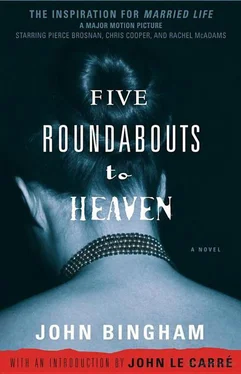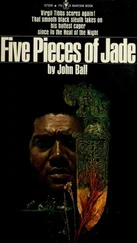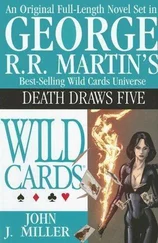John Bingham - Five Roundabouts to Heaven
Здесь есть возможность читать онлайн «John Bingham - Five Roundabouts to Heaven» весь текст электронной книги совершенно бесплатно (целиком полную версию без сокращений). В некоторых случаях можно слушать аудио, скачать через торрент в формате fb2 и присутствует краткое содержание. Жанр: Криминальный детектив, на английском языке. Описание произведения, (предисловие) а так же отзывы посетителей доступны на портале библиотеки ЛибКат.
- Название:Five Roundabouts to Heaven
- Автор:
- Жанр:
- Год:неизвестен
- ISBN:нет данных
- Рейтинг книги:4 / 5. Голосов: 1
-
Избранное:Добавить в избранное
- Отзывы:
-
Ваша оценка:
- 80
- 1
- 2
- 3
- 4
- 5
Five Roundabouts to Heaven: краткое содержание, описание и аннотация
Предлагаем к чтению аннотацию, описание, краткое содержание или предисловие (зависит от того, что написал сам автор книги «Five Roundabouts to Heaven»). Если вы не нашли необходимую информацию о книге — напишите в комментариях, мы постараемся отыскать её.
Five Roundabouts to Heaven — читать онлайн бесплатно полную книгу (весь текст) целиком
Ниже представлен текст книги, разбитый по страницам. Система сохранения места последней прочитанной страницы, позволяет с удобством читать онлайн бесплатно книгу «Five Roundabouts to Heaven», без необходимости каждый раз заново искать на чём Вы остановились. Поставьте закладку, и сможете в любой момент перейти на страницу, на которой закончили чтение.
Интервал:
Закладка:
“So she led me to one side and said she had noticed I was carrying the Psychic Weekly. And only the previous evening her Guide had come to her and told her to watch out for me! He had given her, she said, an exact description not only of me but of the very clothes I was wearing! Right down to these long black earrings! Isn’t that wonderful?
“She said her name was Mrs Brewer, and that if I would care to come that afternoon for a cup of tea she would get in touch with her Guide-a monk who was on earth in the fifteenth century, oh, such a wonderful man! — and she was sure I would be helped.”
“So you went along?”
“So I went along. And Chan came through, too, dear. He said that from now onwards it was his work to help and advise me.”
“And has he?” Bartels asked.
“Has he indeed!” She clasped her hands together in the way she had when she was enjoying, or had just related, a joke of such richness as to be almost unbearable.
Bartels gathered that the long-deceased Oriental, while not binding himself to give detailed stock exchange tips, would point out that the market was rising or falling, that it was time for courage or caution, and that although his protegee might have her times of bitter trial, she would always win through in the end; because he would be by her side, talking through his good friend Mrs Brewer.
Hence the smell in the house, which was caused by joss sticks, and was aunt Emily’s way of showing her appreciation. She said Chan liked them, and she was luckily able to buy them from Mrs Brewer.
“Does she charge anything when you go there?”
Aunt Emily looked at him with an expression of joy and wonder on her gentle, placid face.
“Nothing! Nothing at all! She says that it is her mission in this world to help others to help themselves. She says she feels it would be wrong to accept money for this sort of thing. Mind you, I usually slip a few shillings into her hand when I go, just to help to pay for the tea, and she is more than satisfied. In fact, at first she didn’t want to take it. I had to press it on her.”
Aunt Emily suddenly clasped her hands together again ecstatically.
“Oh, how silly I am! I haven’t told you the most wonderful part! Chan says-just fancy! — that I should look carefully into the financial affairs, in boyhood, of poor uncle Basil!
“He says I must pay particular attention to the will left by his grandfather. He says everything is not all that it seems to be! Fancy! Do you know, dear, I have always had a funny sort of feeling-mind you, I’m not as psychic as poor aunt Rose was-but I have always had a funny sort of feeling that old uncle Basil should have inherited far more money than he did when his mother died.”
“You don’t mean you are starting a case, too?”
But she was not to be drawn. She just smiled mysteriously, and said: “Ah-ha! Wait and see! Perhaps you’ll be surprised one day. Your old auntie Emily may surprise everybody yet!”
Bartels heard her voice droning on, and suddenly and ferociously wondered why he bothered to come to see her.
There was no emotional contact between the two of them, and never had been since the time when, a lonely and bewildered boy, he had first gone to live in the house.
They had treated him kindly enough, with the vague, detached benevolence of people who were eternally preoccupied with their own affairs. But that was all, and the emotions had coiled up tighter and tighter inside him, and even Beatrice had not held the key to the spring.
But you couldn’t just not come anymore, even though she was old and eccentric; indeed, you had to come just because she was that; so you went on calling once a fortnight, and you listened to her drooling on and on. You had no deep affection for her, and she had none for you, but you were a part of the routine of her life, something real in a world which for her was gradually becoming ever more unreal.
The aunt Emilys of this world, he thought bitterly, never had any friends. They had at best a few relatives, who tolerated them, or not, as the case might be. They moved, eccentric and untidy, towards the grave, and nobody cared two hoots.
If you were normal, you shrugged your shoulders and said it was their own fault, and the devil of it was that the normal people were right.
If you weren’t normal, if you were tortured by compassion and afraid of your own thoughts, you came once a fortnight, and were bored and irritated, because it was easier to pay a visit rather than stay at home and reproach yourself for not visiting her.
He saw aunt Emily rise and go across and open her writing desk, which stood in a corner of the drawing room, and watched her come back with a pencil sketch about eight inches by six inches.
“That’s Chan. Madame Clevistki did it,” said aunt Emily.
“Madame who?”
“Clevistki. Isn’t it beautiful? What a dignified, wise old face, eh?”
“Who on earth is Madame Clevistki?”
“She is a White Russian, dear, a friend of Mrs Brewer’s. She is really a princess, you know, but she does not use her title. Oh, my, she’s so psychic! Directly I shook hands with her it was like an electric shock going right up my arm.”
“I see.”
“She lived at the time of Peter the Great. A wonderful, wonderful man!”
“Do you mean she is dead, like Chan?”
“No, no, no, dear,” said his aunt Emily chidingly. “I mean that in her former life she was at the Court of Peter the Great. She has a most wonderful studio in the Fulham Road, and all the most famous painters come to her for lessons, says Mrs Brewer. Of course, she drew Chan in a trance.”
“Oh, of course. What did she charge you?”
“Nothing dear, only the cost of her taxi to and from Fulham Road; seven and six, I think it was, in all; and that was only because she had to fit the trance in between painting lessons. She is like Mrs Brewer; she feels she has been put into this world to help others. She doesn’t feel she would be acting right if she made money out of her great psychic powers.”
He watched his aunt replace the drawing in the bureau and wondered whether Chan, the talented mandarin, would stagger them all at the next seance. Would his voice, constricted within the vocal cords of Mrs Brewer, burst forth in high-pitched tones and cry: “Watch Philip Bartels! He has a lean and hungry look. He thinks too much. Such men are dangerous.”
Or would the voice, struggling with the unaccustomed syllables, say: “Altrapeine. This poison is exceptionally difficult to detect. Its action is swift and painless and in the case of a fatal dose the circumstances surrounding the death of the subject closely resemble those attendant upon coronary thrombosis.” That, more or less, was what the book had said.
Bartels didn’t think Chan would be so practical.
Chapter 7
It is one thing to murder in a speculative kind of way, but except for those who blunder into the crime, there comes a pause between the impersonal contemplation of the deed, and the realization that there is the remotest possibility of the deed being carried through.
Again, excepting sudden acts of violence, the mind needs time to become attuned to the idea; the social sense inherent in all of us is instinctively outraged and requires a period of softening-up; the odds for and against success have to be calculated; and courage must be summoned to risk capital punishment.
For a man of Philip Bartels’ temperament and imagination there comes, later, a curious interlude. The emotions involved in taking the decision have subsided, the greater emotions involved in the crime still lie ahead. Between plan and final action the husband, in the case of a married couple, regards his wife with a strange detachment.
Читать дальшеИнтервал:
Закладка:
Похожие книги на «Five Roundabouts to Heaven»
Представляем Вашему вниманию похожие книги на «Five Roundabouts to Heaven» списком для выбора. Мы отобрали схожую по названию и смыслу литературу в надежде предоставить читателям больше вариантов отыскать новые, интересные, ещё непрочитанные произведения.
Обсуждение, отзывы о книге «Five Roundabouts to Heaven» и просто собственные мнения читателей. Оставьте ваши комментарии, напишите, что Вы думаете о произведении, его смысле или главных героях. Укажите что конкретно понравилось, а что нет, и почему Вы так считаете.












